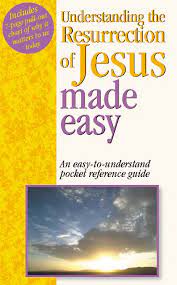Resurrection hope
The resurrection of Jesus Christ is one of the foundational tenets of our Christian faith. If Christ had remained in that darkened tomb, preaching the message of the gospel would have been in vain. (Imagine all the revivals you could have skipped). Our faith would be in vain (1 Cor. 15:14). Worst of all, we would still be dead in our sins (1 Cor.15:17). Just imagine! Guilt, shame, bondage, spiritual death—all these would still be at play in our lives.
The crucifixion had dashed the hopes of the disciples. They had imagined how life would be as part of the promised Messiah’s entourage. Plus, they would finally be delivered from the tyranny of Rome. But what happened? Jesus was dead. They scattered and hid for fear of the Jewish leaders (John 20:19). They returned to their old homes and their old lives–disappointed, disillusioned, and disheartened.
But God. The Creator of heaven and earth, the Great Deliverer of Israel from Egypt, raised Jesus from the grave (Acts 13:30). God made good on His promise to deliver man from sin’s grip and “begat man again” (Eph. 2:1, 5). In Christ, man was a new creature (2 Cor. 5:17). Resurrection was, and still is, definitive proof that God is sovereign with power over life and over death.
Resurrection promise
God’s plan of salvation has always included resurrection (Gen. 3:15). The Old Testament prophets and psalmists spoke of, not only the promised Savior’s coming, but also of his death and resurrection (Ps. 16:10; Ps. 53:11; Ps. 45:6-7; Ps. 110:1; Is. 53:11).
Because of this, it is somewhat surprising that Jesus’ disciples initially disregarded the resurrection proclamation (Mark 16:11; Luke 24:11).
In the horror and grief of the crucifixion, the Disciples had forgotten that Jesus Himself told them that he must “suffer at the hands of sinners, be crucified, and be raised the third day.” (Matt. 16:21; 17:22-23; 20:17-19). The disciples were devastated by Jesus’ words. Unfortunately, they missed the good news beyond the death of Jesus—resurrection on the third day.
On the other hand, it is ironic that the chief priest and Pharisees, who rejected Jesus as the Messiah, remembered Jesus’ statement that He would rise again after three days. They requested from Pilate a Roman centurion to guard the tomb (Matt. 27:62-66). Was it an empty tomb they feared or the risen Christ?
Resurrection confusion
In reading the synoptic Gospels and John, the followers of Jesus shared a common reaction to the resurrection. They did not believe it. Some scholars say Mary Magdalene imagined that grave robbers had stolen Jesus’ body (John 20:11-13).
Our four gospel writers all complete their narratives of the Gospel of Jesus with a story or stories of Jesus resurrection. They come at it from different directions and provide different details, but one element is common to each of them: a sense of wonder, astonishment, and surprise. Despite the several hints scattered throughout the Hebrew scripture and Jesus’ three explicit statements forecasting his resurrection (Mark 8:31; 9:31; 10:34), when it happened it turned out that no one–no one–expected it. The first people involved in Jesus’ resurrection were totally involved in dealing with his death. Now they had to do a complete about-face and deal with his life. [1]
Resurrection possibilities
Do we as believers “scatter” as we are daily challenged by unbelievers who reject Christ? Do we “hide” from those who discount the resurrection? Even after Easter Sunday, do we return to our old lives—disappointed and disillusioned. Are we disheartened by the continuation of the health pandemic, financial uncertainty, and social unrest?
If you answered yes to any of these questions, then it is time that we believers expand our understanding of the resurrection. As new creatures in Christ, victorious living awaits us as the Spirit that raised Christ from the grave, now indwells us (Rom. 8:11).
Eastertide, a fifty-day season on the Christian calendar, is dedicated to examining the deep and wonderful mystery of resurrection. It is a perfect opportunity to reflect on what the resurrection means to us personally. “It is a season of learning how to live a new kind of life called resurrection.”[2]
Next week, we will continue our teaching on “resurrection understanding”. The resurrection is key in strengthening our resolve to press forward through difficult times. Most importantly, it enables us to live out our God ordained purpose. Let’s explore what it means to live each day in the light of the resurrection (Eph. 2:4-6).
[1] Living the Resurrection, Eugene H. Peterson.
[2] Living the Way of Jesus: Practicing the Christian Calendar One Week at a Time, Michaele Lavigne.

